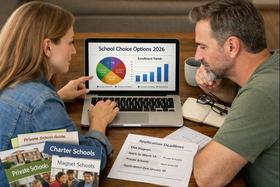Swmetro Level 3 serves 12 students in grades Kindergarten-8.
The student-teacher ratio of 12:1 is lower than the Minnesota state level of 13:1.
Minority enrollment is 33% of the student body (majority Black), which is lower than the Minnesota state average of 39% (majority Black).
Quick Facts (2026)
- School Type: Special education school
- Grades: Kindergarten-8
- Enrollment: 12 students
- Student-Teacher Ratio: 12:1
- Minority Enrollment: 33%
- Source: National Center for Education Statistics (NCES), MN Dept. of Education
School Overview
School Type
Grades Offered
Grades Kindergarten-8
Total Students
12 students
Gender %
Total Classroom Teachers
1 teacher
School Rankings
The diversity score of Swmetro Level 3 is 0.51, which is less than the diversity score at state average of 0.59. The school's diversity has stayed relatively flat over five school years.
Student-Teacher Ratio
12:1
13:1
American Indian
n/a
2%
Asian
n/a
7%
Hispanic
8%
12%
Black
17%
12%
White
67%
61%
Hawaiian
n/a
n/a
Two or more races
8%
6%
All Ethnic Groups
Eligible for Free Lunch
58%
36%
Eligible for Reduced Lunch
8%
7%
School Statewide Testing
School District Name
Source: National Center for Education Statistics (NCES), MN Dept. of Education
Frequently Asked Questions
How many students attend Swmetro Level 3?
12 students attend Swmetro Level 3.
What is the racial composition of the student body?
67% of Swmetro Level 3 students are White, 17% of students are Black, 8% of students are Hispanic, and 8% of students are Two or more races.
What is the student-teacher ratio of Swmetro Level 3?
Swmetro Level 3 has a student ration of 12:1, which is lower than the Minnesota state average of 13:1.
What grades does Swmetro Level 3 offer ?
Swmetro Level 3 offers enrollment in grades Kindergarten-8
What school district is Swmetro Level 3 part of?
Swmetro Level 3 is part of Southwest Metro Intermediate 288 School District.
School Reviews
Review Swmetro Level 3. Reviews should be a few sentences in length. Please include any comments on:
- Quality of academic programs, teachers, and facilities
- Availability of music, art, sports and other extracurricular activities
Recent Articles

Back-to-School Tech & Online Learning Readiness Checklist
A 2026 guide to back-to-school tech & online learning readiness, helping families prepare devices, connectivity, skills, and safety.

How Public Schools Prepare for College in High School
Learn how public schools prepare for college and what parents should look for as students begin high school. Updated for 2026.

School Choice in 2026: What Parents Must Know
Explore how school choice is reshaping U.S. education in 2026, with updated trends, enrollment data, costs, policies, and practical guidance for parents.





